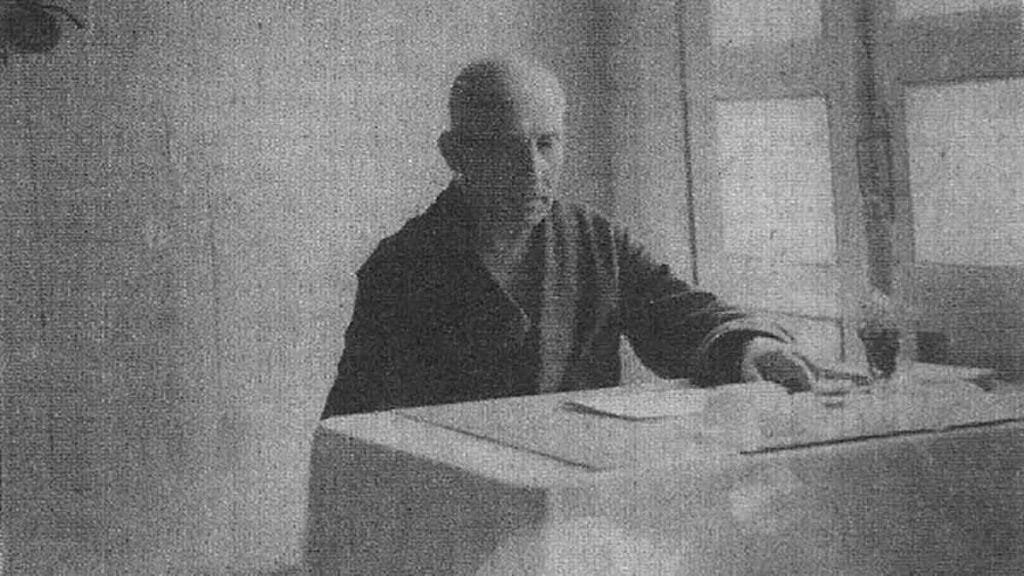Alexander Veprik - Soviet composer, musician, teacher, public figure. He was subjected to Stalinist repressions. This is one of the most famous and influential representatives of the so-called "Jewish school".
Composers and musicians under Stalin's rule were one of the few "privileged" categories. But, Veprik, was among the "lucky ones" who went through all the litigation of the reign of Joseph Stalin.
Childhood and youth of Alexander Veprik
The future composer, musician and teacher was born in Balta near Odessa into a Jewish family. Alexander's childhood passed on the territory of Warsaw. Veprik's date of birth is June 23, 1899.
His childhood and youth are inextricably linked with music. From early childhood, he mastered playing several musical instruments. He was especially attracted to improvisation, so Alexander entered the Leipzig Conservatory.
With the outbreak of World War I, the family returned to Russia. Veprik began studying composition under Alexander Zhitomirsky at the conservatory of the country's cultural capital. At the beginning of 1921, he moved to Myaskovsky at the Moscow Conservatory.
During this period of time he was one of the most active members of the party of the so-called "red professors". Party member members opposed the liberalists.
Veprik taught at the Moscow Conservatory until the early 40s. At the end of the 30s, he was appointed dean of the educational institution. The composer quickly moved up the career ladder.
At the end of the 20s, he was sent on a business trip to Europe. The maestro exchanged experience with foreign colleagues. Also, he made a presentation in which he spoke about the system of music education in the USSR. He managed to communicate with famous European composers and learn from the invaluable experience of foreign colleagues.
Alexander Veprik: musical compositions
It has already been noted above that Alexander Veprik is one of the brightest representatives of Jewish musical culture. The first piece of music that gave him popularity - he presented in 1927. We are talking about the composition "Dances and songs of the ghetto".
In 1933 he presented "Stalinstan" for choir and piano. The work did not go unnoticed by music lovers. He was at the top of the musical Olympus.
Despite the fact that he made great strides in the musical field, the composer's career soon began to decline. It was not until the twilight of the 30s that he tasted the taste of popularity. He was ordered to the Kyrgyz opera "Toktogul", which in the end completely changed his life.
In 43, he was dismissed in disgrace from the Moscow Conservatory. During this period of time, nothing was heard about the maestro. He practically did not compose new works and led a reclusive lifestyle.
Only after 5 years the position of the musician improved slightly. Then the head of the Union of Composers T. Khrennikov decided to give the composer a position in his apparatus.
At the end of the 40s, he completed the second edition of the Toktogul opera. Note that the work remains unfinished. The opera was staged only after the death of the maestro. A year later he was arrested. Veprik was sentenced to 8 years in prison.
Among his musical compositions, we recommend listening to piano sonatas, violin suite, viola rhapsody, as well as Kaddish for voice and piano.
Alexander Veprik: arrest
Some interrogations after the arrest of the composer concerned the opera Toktogul, which the maestro composed for the theater of Kyrgyzstan. The investigator who led the case of Veprik was far from music. However, he argued that the opera does not carry Kyrgyz motifs, but is "Zionist music."
The Soviet authorities also remembered the western business trip to Alexander Veprik. In fact, an innocent trip to Europe was supposed to contribute to the reform of music education, but the Stalinist authorities considered this trick as a betrayal.
In the spring of 51, the composer was sentenced to 8 years in labor camps. He was "sewn" a case for allegedly listening to foreign radio broadcasts and storing banned literature on the territory of the USSR.
Alexander was sent first to prison, and then the word "stage" followed. At the mention of the word "stage" - the composer was thrown into sweat until the end of his days. The stage is mockery and torment in one bottle. The prisoners were not only destroyed morally, suggesting that they were mediocre, but also physically abused.
Alexander Veprik: life in the camps
Then he was sent to the Sosva camp. In places of deprivation of liberty, he did not work physically. The composer was assigned a job that was close to him in spirit. He was responsible for organizing the cultural brigade. The brigade had prisoners who were far from music.

A year later, Alexander's position changed dramatically. The fact is that a decree was issued according to which all prisoners who fell under Article 58 should be separated from the rest.
The management of Sev-Ural-Laga decided to return Alexander to Sosva. He was again brought in to work with the cool brigade. One of the employees of the main department advised the maestro to compose some kind of patriotic piece of music.
The prisoner began work on the first part of the cantata "The People-Hero". Botov (an employee of the main department) sent the work to the Union of Composers. But the work there was criticized. The cantata did not make the right impression on the critics.
After Stalin's death, Alexander wrote to his sister an application for reconsideration of his case addressed to Rudenko, Prosecutor General of the Soviet Union.
Having considered the case, Rudenko said that the maestro would soon be released. But “soon” dragged on for an indefinite period of time. Instead, Alexander was to be sent to the capital.
Interesting facts about the composer
- In 1933, "Dances and Songs of the Ghetto" by the Soviet composer were performed by the Philharmonic Orchestra, led by Arturo Toscanini.
- A few days after the death of the maestro, the premiere of the opera Toktogul took place at the festival of Kyrgyz music in the capital of the Russian Federation. The posters did not indicate the name of the maestro.
- A large number of maestro's musical compositions remained unreleased.
Death of Alexander Veprik
Alexander Veprik spent the last few years of his life fighting the Soviet bureaucracy. He was released in 1954 and spent a whole year trying to get his apartment back, in which the authorities had already managed to settle the musicologist Boris Yarustovsky.
His compositions were wiped off the face of the earth. He was deliberately forgotten. He felt slumped. He died on October 13, 1958. The cause of the composer's death was heart failure.
In our time, the musical works of the Soviet composer are performed both in Russia and abroad.



